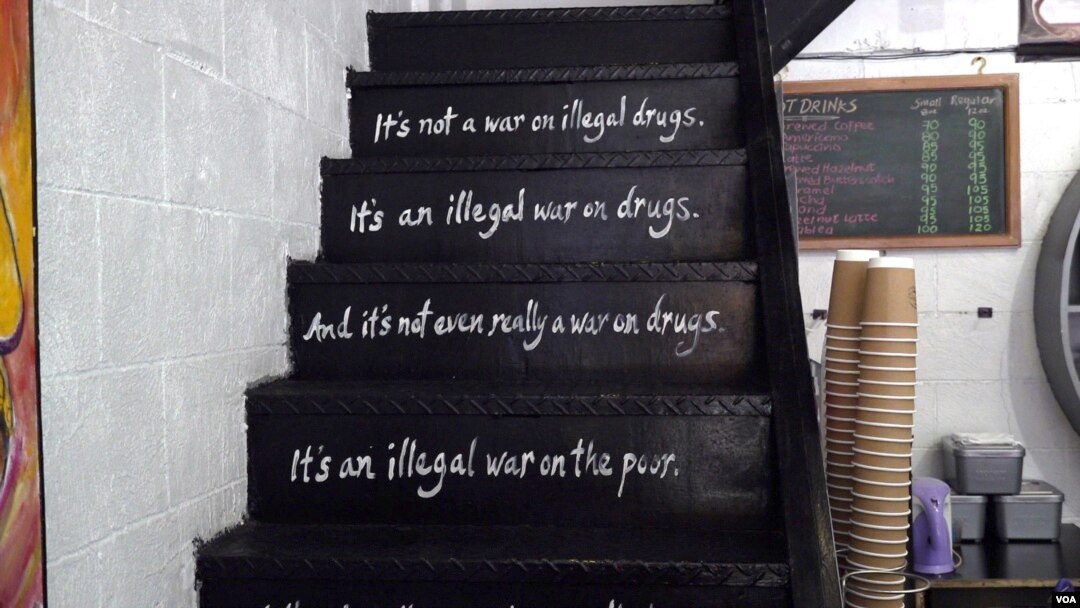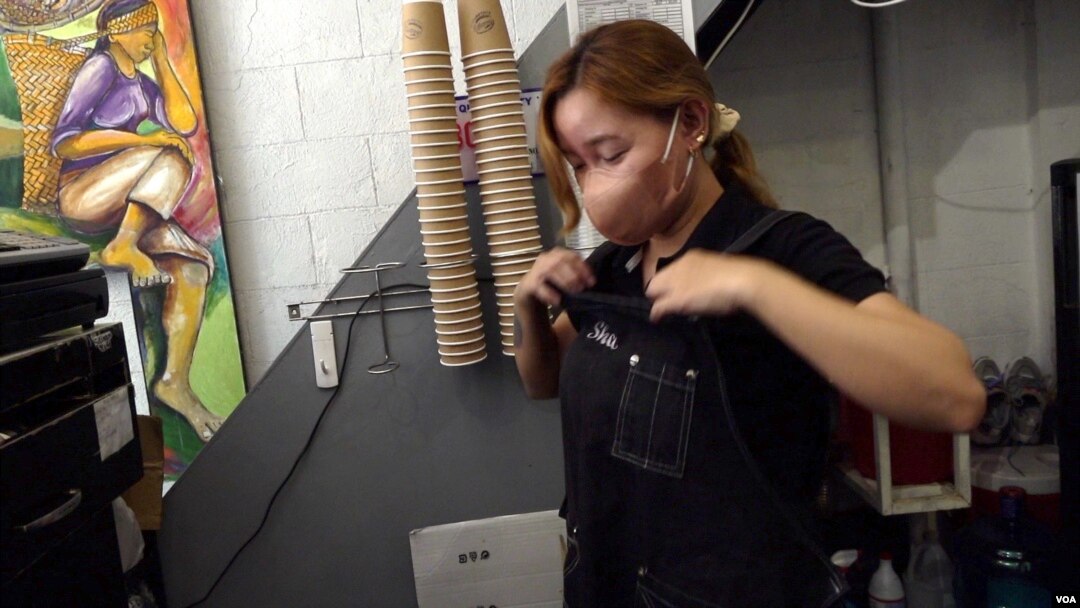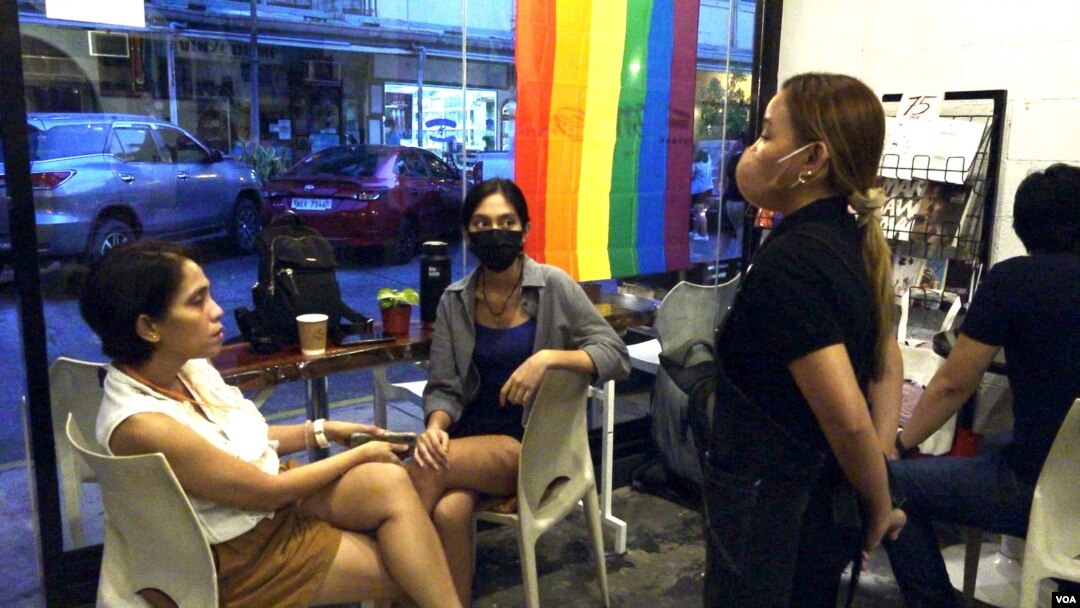The words painted on the staircase at the Silingan coffee shop make it clear that this place is about much more than just serving lattes and fruit smoothies.
"It's not a war on illegal drugs. It's an illegal war on drugs," the message says.
Silingan means neighbor. Most of the workers at this cafe near the capital, Manila, are mothers, daughters, sisters or wives of people killed during former President Rodrigo Duterte's grisly war on drugs.

The staircase at Silingan coffee shop near Manila sends a clear message regarding the war on drugs. (Dave Grunebaum/VOA)
"They didn't have to be killed like animals," head barista Sharon Angeles said through tears while recounting how her 20-year-old brother Christian was killed in 2016 during Duterte's first year as president. "They killed him like he was an evil person. It's so difficult."

Sharon Angeles, head barista at Silingan coffee shop near Manila, lost her 20-year-old brother, Christian, in 2016. Angeles says Christian was not involved with drugs but was killed because he was at the wrong place at the wrong time. (Dave Grunebaum/VOA)
Government data says about 6,200 people were killed in police operations tied to the drug war during Duterte's six-year term, which ended last month. Human rights groups, however, say the real death toll could be as high as 30,000, including executions by vigilantes who, according to activists, often work closely with police.
Duterte repeatedly defended his campaign as a necessary part of combating the national onslaught of drugs, especially in poor communities where police officers were killing in self-defense.
But human rights groups denounce Duterte for inciting vigilante violence against drug users and accuse police of murdering unarmed suspects, as well as falsifying evidence. The high death toll, plus graphic images in the media of corpses on the streets, have led to heavy criticism overseas and accusations of potential crimes against humanity.
While there were also protests in the Philippines against the drug war, Duterte retained popularity at home, leaving office with a 75% approval rating, according to a survey by Publicus Asia.
Silingan customer Patricia Tierra, a local university student, says listening to coffee shop employees' stories puts a human face on the consequences of former Philippines President Rodrigo Duterte's drug war. (Dave Grunebaum/VOA)
Silingan customer Patricia Tierra, 21, a local university student, said there's a typical perception in the Philippines about people killed in the drug war.
"It's common to hear them say that they deserve to die because they're doing negative effects to society," she said, adding that the personal stories of the baristas at Silingan put a human face to consequences of the drug war. "Their stories are real, and the effects of the drug war [are] real, and they're not just numbers. They're people."
By sharing personal experiences, head barista Angeles hopes customers gain a sense of the impact the drug war is having on families of the deceased.
"We hope we can change the negative connotations that are out there of people killed in the drug war," she said. "Some people sympathize with us, but some judge us."
Ryan Martinez, 25, who visits Silingan every other week, sipped a dulce latte on a recent night.
Your browser doesn’t support HTML5
At Philippine Coffee Shop, Baristas Serve Heartbreaking Stories
"The story they're trying to tell is personal. It tells a different side of the drug war than what many people in this country hear and read about," Martinez said. "At this coffee shop you're hearing it from people who have been directly impacted by it. So, it makes a difference."
In addition to earning income, the baristas bond over their shared grief and provide a support network for one another.
"We're all family and friends of [extra-judicial killings] victims," said Joy Solayao, whose partner, Albert Cubeta, was killed in 2017. "When I tell them my story, they can relate to me because they've had the same experience."
Joy Solayao grinds beans at the Silingan coffee shop near Manila. Solayao, like most employees at the shop, lost a loved one during former Philippines President Rodrigo Duterte's war on drugs. (Dave Grunebaum/VOA)
Both Solayao and Angeles say their loved ones were not involved with drugs and were killed because they were at the wrong place at the wrong time. But both of them also defend the right of drug users and low-level dealers to live.
"People should know that not everyone who's connected to drugs deserves to be killed," said Angeles.
Both women want Rodrigo Duterte held accountable for the violence but acknowledged that seems unlikely. His daughter, Sara Duterte-Carpio, is now vice president to recently elected President Ferdinand Marcos Jr., the namesake of the late dictator.
Solayao and Angeles expect the new administration to try to block any genuine efforts to investigate and hold Duterte accountable, including plans by International Criminal Court prosecutors to reopen an investigation into killings and other suspected human rights abuses during the war on drugs.
"I want Duterte to go to jail and regret what he has done to so many families," Solayao said. "But his daughter and Marcos will protect him."
Either way, baristas at Silingan will keep sharing their stories in the hopes that they can at least gain ground in the court of public opinion.


